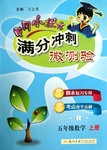题目内容
I don't remember____________ the book yesterday.
A. where I put B. where did I put
C. where will I put D. where l will put
A
【解析】英语宾语从句中一般为陈述语序。根据时间状语yesterday,昨天,可知从句中描述的是过去发生的动作,故从句中用一般过去时态。选B为倒装语序,故选A。
考点:宾语从句

 小天才课时作业系列答案
小天才课时作业系列答案 一课四练系列答案
一课四练系列答案 黄冈小状元满分冲刺微测验系列答案
黄冈小状元满分冲刺微测验系列答案 新辅教导学系列答案
新辅教导学系列答案 阳光同学一线名师全优好卷系列答案
阳光同学一线名师全优好卷系列答案
“Can I learn to play the violin.Daddy?”Ann asks her father.
“That sounds good.But how long can you learn?”
“A month,” Ann says.“After a month,I can play for you.If I don’t play well,I won’t play it.”
“All right.” her father says.
He soon finds a violin teacher and Ann starts her lessons.The fee(费用) isn’t cheap,but her father doesn’t say anything.
A month passes.The time comes for Ann to play for her father.
She says to her father, “I want to play for you,Daddy.”
“OK,Ann,”her father says.“Start”
She starts to play.She doesn’t play well.Her father has a friend with him,and the friend can’t stand(忍受)it.
When Ann stops,her father says, “Great! Ann, you can have more lessons.”
Ann runs out of the room.Her father’s friend says to him, “I don’t think your daughter plays well.”
“Well,you’re right.”her father says.“But she’s very happy, right?”
【小题1】Ann thinks playing the violin is________, so she wants to learn it.
| A.tired | B.dangerous(危险的) | C.boring(无聊的) | D.interesting |
| A.two weeks | B.six weeks | C.a month | D.six months |
| A.Ann’s father | B.Ann’s father’s friend |
| C.Ann’s mother | D.Ann’s uncle |
| A.Ann plays well | B.the fee is very cheap |
| C.he loves Ann | D.he 1ikes the violin |
| A.Ann doesn’t 1ike playing the violin |
| B.Ann can have more 1essons |
| C.Ann doesn’t want to have more 1essons |
| D.Ann’s father doesn’t have a friend |
Every culture has a recognized (公认的) point when a child becomes an adult, when rules must be followed and tests passed.
In China, although teenagers can get their ID cards at 16, many only see themselves as an adult when they are 18. In the US, where everyone drives, the main step to the freedom of adult life is learning to drive. At 16, American teens take their driving test. When they have their license(证), they drive into the grown-up world.
"Nobody wants to ride the cheese bus to school," said Eleanor Fulham, 17. "It's like you're not cool if you don't have a car," she said.
According to a recent research, 41% of 16 to 19 year olds in the US own cars, up from 23% in 1985. Although, most of these cars are bought by parents, some teens get part-time jobs to help pay.
Not all families can afford cars for their children. In cities with undergrounds and limited(有限的) parking, some teenagers don't want them. But in rich areas outside the city, if there are no undergrounds, and bicycles are more for fun than cars, it is strange for a teenager not to have a car.
But police say 16-year-olds have almost three times more accidents than 18 and 19-year-olds. This has made many parents stop before letting their kids drive. They need to wait until they are more experienced.
Julie Susiana, of Virginia, decided that her son Chad, 15, will wait until he is 17 to apply for his learner's permit (许可)
Chad said he has accepted his parents' decision, although it has caused some laughing from his friends. "They say that I am unlucky," he said. "But I'd rather be alive than driving, and I don't really trust my friends on the road either."
In China as more families get cars, more 18-year-olds learn to drive. Will this become a big step to becoming an adult?
1.16-year-old drivers have more accidents possibly because _______.
A. they want to show themselves off
B. they are not experienced drivers
C. older people always drive better
D. they never drive carefully on the road
2.Which may NOT be taken into consideration when deciding whether to buy a car?
A. How rich the family is.
B. Whether the kid is old enough.
C. What traffic condition there is around.
D. Whether it's practically needed.
3.The passage mainly gives information about _______.
A. an American culture about teenagers' driving
B. a change in the Chinese culture
C. a cultural difference between America and China
D. the relationship between driving and a person's development
4.Which may serve as the best title of the article?
A. Cars Helping You to Grow Up B. Driving into the Grown-up World
C. Teenagers' Driving in America D. Recognized Point of Becoming an Adult